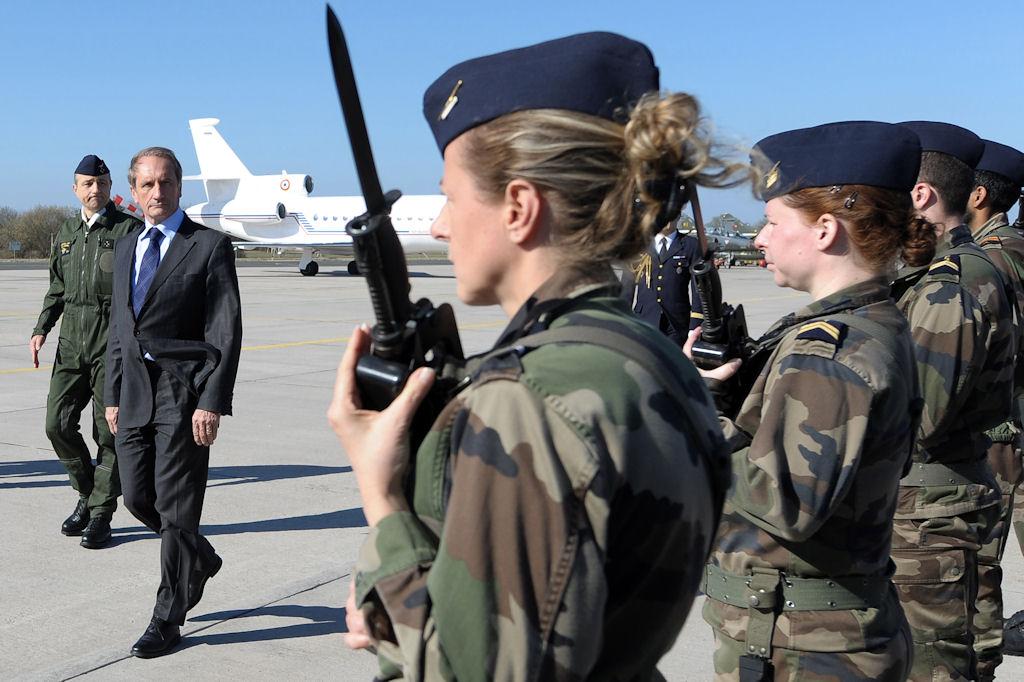France shows its hawkish side in Libya, Ivory Coast
French Defense Minister Gerard Longuet reviews troops on arrival to the BA 133 air base in Nancy-Ochey, eastern France, on March 25, 2011. Mirages 2000-D from BA 133 base made the first air strikes in Libya.
PARIS, France ― Of the many ways the world has changed in the past three months, one is clear: France has turned into a hawk.
The country that opposed the 2003 invasion of Iraq, subjecting it to the scorn of Washington’s hawks, has just taken decisive action in Libya and Ivory Coast. On Monday, former Ivory Coast president Laurent Gbagbo surrendered underneath the whirring blades of French military helicopters. On Tuesday, French Foreign Minister Alain Juppe called out NATO’s management of air attacks on Libyan government forces, saying the alliance needs to do more to protect Libyan rebels.
The recent displays of military might represent an about-face from earlier this year, when France watched the Tunisian and Egyptian uprisings from the sidelines.
“The caricature of France as being wimpy surrender monkeys was exaggerated and false,” said Judah Grunstein, the editor-in-chief of World Politics Review. He described the country’s characterization as a military lightweight as an “American misperception of France” at best and certainly not a view shared by French President Nicolas Sarkozy. “He doesn’t have the same impression of France’s limitations as a global leader as American observers.”
Grunstein pointed to the country’s long military history dating back to the time of Napoleon. Sarkozy, since taking office in 2007, has committed to maintaining France’s prominence on the global stage. He ordered a review of the country’s defense strategy and in 2009 decided to rejoin NATO’s command structure. When Sarkozy saw the chance to exercise French leadership, especially after U.S. President Barack Obama’s initial reluctance to intervene in Libya, he took it.
Rejoining NATO not only helped renew Sarkozy’s “gut instinct of friendship with the United States” after the strain over Iraq, Grunstein said, but it also gave France a bigger voice, which it used to make the case for military intervention in Libya and the Ivory Coast.
“At a certain point, someone needed to do what needed to be done,” Grunstein said of France’s coordinated effort with the United Nations to launch air strikes that aided in Gbagbo’s capture. “[Sarkozy] has a real nose for political leverage; he just filled a leadership vacuum.”
But France’s show of military might hearkens not just back to Napoleonic days, but a more recent era when France was a colonial power.
The end of a standoff that had kept the Ivory Coast in limbo since November elections did little to shield the French government from criticism that it was showing its neocolonialist side by interfering. A Paris-based Gbagbo supporter and spokesman, Alain Toussaint, accused France of essentially staging a coup d’etat, telling Radio France International that the French ousted Gbagbo to put Alassane Ouattara in power in order to get its hands on the West African country’s resources.
French officials have repeatedly denied that the French military took part in Gbagbo’s physical capture, saying he surrendered to Ivorian forces, thus paving the way for Ouattara, the internationally recognized election winner, to take power in Ivory Coast.
France has been keen to act robustly while avoiding any perception that it was behaving as Africa’s policeman. Prime Minister Francois Fillon, during a meeting with lawmakers Tuesday, expressed pride that, “France participated in the defense of democracy in Africa.”
“With the U.N., we have sent a very strong symbolic message to all dictators,” Fillon said. “We told them that legality and democracy should be respected and that there were risks for those who did not.”
Ultimately, history will decide if the French president who once cozied up to dictators like Tunisia’s Zine el-Abidine Ben Ali and rolled out a stately welcome mat for Libya’s Muammar Gaddafi will be regarded as a leader or a meddler. But how the French view him will have immediate consequences for Sarkozy, who must run for re-election next year.
Roughly 66 percent of French people support allied efforts in Libya, according to a March opinion poll. Will this approval translate into better approval ratings for Sarkozy or change his image, battered by the economic crisis, in the long term?
"The perception is he’s so pragmatic and opportunistic that he doesn’t believe in anything,” Grunstein said. While in reality, he said, Sarkozy has focused on the prosperity of countries ringing the Mediterranean since he first took office. Libya “was an opportunity to put his beliefs into practice.”
The French will judge Sarkozy based on what happens in Libya and Ivory Coast over the coming year. In Libya, Sarkozy has recognized an opposition government about which little is known. It’s a political risk.
Following a press conference last month, former Foreign Minister Bernard Kouchner spoke of Sarkozy’s “generosity” in proposing “to protect civilians” in Libya and intervening on humanitarian grounds. Peace keeping and peace making, he said, were two different kinds of missions.
Every day, reporters and producers at The World are hard at work bringing you human-centered news from across the globe. But we can’t do it without you. We need your support to ensure we can continue this work for another year.
Make a gift today, and you’ll help us unlock a matching gift of $67,000!
